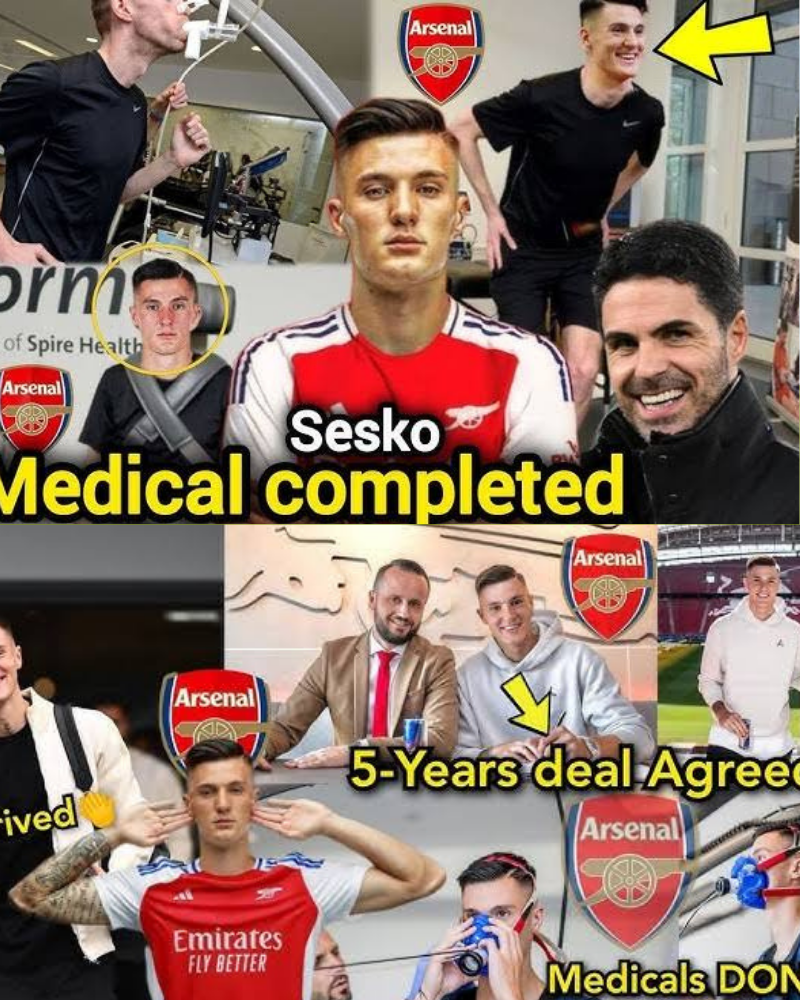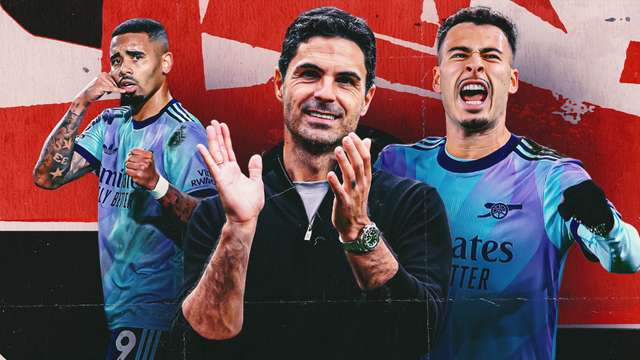Transfer news LIVE! Sesko to Arsenal twist; Chelsea eye Joao Pedro; Wirtz to Liverpool medical; Man Utd late

The summer transfer window has officially reopened, bringing with it a whirlwind of activity as Europe’s elite clubs scramble to strengthen their squads ahead of the new season. With Premier League giants Arsenal, Chelsea, Manchester United, and Liverpool all actively pursuing major signings, the market is heating up with deals worth hundreds of millions of pounds hanging in the balance.
Arsenal’s search for a world-class striker has taken an intriguing new direction, with reports emerging that the Gunners have successfully agreed personal terms with RB Leipzig’s Benjamin Sesko. This development represents a significant shift in their transfer strategy, as the North London club had previously been weighing up options between the Slovenian international and Sporting CP’s Viktor Gyokeres.
The agreement with Sesko marks a crucial breakthrough in Arsenal’s pursuit of firepower up front, a position that has been identified as a priority following their near-miss in the Premier League title race. The 21-year-old striker has been in exceptional form for Leipzig, demonstrating the kind of clinical finishing and physical presence that Mikel Arteta’s system desperately needs.
German reports suggest that while personal terms have been agreed, Arsenal now face the challenge of negotiating with Leipzig, who have set a firm asking price of £60 million for their prized asset. The Bundesliga club’s valuation reflects Sesko’s rapid development and his status as one of Europe’s most promising young strikers. Arsenal are expected to submit an offer close to Leipzig’s demands, recognizing that securing a player of Sesko’s caliber could be the missing piece in their title puzzle.
However, Arsenal’s transfer ambitions don’t end with Sesko. The club remains interested in Aston Villa’s Morgan Rogers, viewing the versatile forward as another potential addition to their attacking ranks. This multi-pronged approach demonstrates Arsenal’s commitment to building squad depth and ensuring they have adequate cover across multiple positions.
The Gyokeres situation has become increasingly complex, with reports suggesting the Swedish striker is prepared to go on strike to force his exit from Sporting CP. While this dramatic development might have created an opportunity for Arsenal, the club appears to have prioritized the Sesko deal, perhaps viewing him as a more sustainable long-term investment given his age and potential for growth.
Arsenal’s transfer activities also extend to potential disappointments, with both Rodrygo from Real Madrid and Athletic Bilbao’s Nico Williams appearing increasingly unlikely to make the move to the Emirates Stadium. These setbacks underscore the competitive nature of the current transfer market, where top talents often have multiple suitors and astronomical price tags.
Chelsea’s transfer strategy under Enzo Maresca continues to reflect the club’s ambitious approach to squad building, with multiple high-profile targets across various positions. The Blues have reportedly made contact regarding Brighton’s Joao Pedro, potentially beating Newcastle United to the Brazilian’s signature in what would be a significant coup for the West London club.
Pedro’s versatility and Premier League experience make him an attractive proposition for Chelsea, who are looking to add creativity and goal threat to their attacking third. The Brazilian has been one of Brighton’s standout performers, demonstrating the kind of consistency and quality that could seamlessly translate to a bigger club environment.
Simultaneously, Chelsea have reopened negotiations for Borussia Dortmund winger Jamie Gittens, after their previous £42 million offer was swiftly rejected by the German club. Maresca has been vocal about his desire to add another winger to his squad, and Gittens represents exactly the kind of dynamic, pace-driven threat that could complement Chelsea’s existing attacking options.
The renewed interest in Gittens comes despite Chelsea’s identification of Lyon’s Malick Fofana as an alternative target. However, the Blues now face competition from Liverpool for Fofana’s services, highlighting the interconnected nature of the current transfer market where clubs often find themselves competing for the same players across multiple deals.
Chelsea’s ongoing talks with West Ham United regarding Mohammed Kudus add another dimension to their transfer pursuits. The Ghanaian international has been one of the Hammers’ most impressive signings in recent years, and his potential availability has naturally attracted interest from larger clubs looking to strengthen their squads.
The Blues’ approach appears to be one of casting a wide net, ensuring they have multiple options available should their primary targets prove difficult to secure. This strategy reflects the lessons learned from previous transfer windows where over-reliance on single targets led to last-minute scrambles and overpayment for alternative options
Liverpool’s transfer activity this summer is set to be nothing short of spectacular, with the club reportedly prepared to break the British transfer record twice in a single window. The imminent arrival of Florian Wirtz represents the first of these record-breaking deals, with the German international set to undergo his medical today as Liverpool look to finalize an agreement worth up to £116 million including add-ons.
Wirtz’s arrival at Anfield would represent a statement of intent from Liverpool’s new ownership and management structure. The Bayer Leverkusen midfielder has been one of Europe’s most coveted talents, combining technical brilliance with tactical intelligence in a way that perfectly suits Arne Slot’s playing philosophy. His versatility to operate across multiple positions in Liverpool’s attacking third provides the kind of flexibility that modern football demands.
The medical process for Wirtz is expected to be completed over multiple days, reflecting both the magnitude of the transfer and the thorough due diligence required for such a significant investment. Liverpool’s medical team, renowned for their comprehensive approach to player assessment, will leave no stone unturned in ensuring their potential record signing is in optimal condition.
Beyond Wirtz, Liverpool’s ambitions extend to potentially breaking the British transfer record once again in their pursuit of Newcastle United’s Alexander Isak. Reports suggest the Reds are prepared to meet the Magpies’ £150 million valuation for the Swedish striker, who has established himself as one of the Premier League’s most clinical finishers since his move to St. James’ Park.
Isak’s potential arrival would address Liverpool’s need for a world-class striker to replace Darwin Nunez, who has struggled to consistently deliver the goals expected at the highest level. The Swedish international’s combination of pace, movement, and finishing ability would provide Liverpool with a different dimension in attack, potentially making them even more dangerous in their title defense.
Liverpool are also working on completing a deal for Bournemouth’s Milos Kerkez, with negotiations ongoing to secure the Hungarian left-back’s services. Kerkez has been identified as a long-term successor to Andy Robertson, bringing youth and attacking impetus to a position where Liverpool are looking to plan for the future.
The competition for Hugo Ekitike adds another layer to Liverpool’s striker search, with Manchester United and Chelsea also reportedly interested in the French forward. This multi-club interest reflects Ekitike’s growing reputation and the premium placed on young, talented strikers in the current market.
Manchester United’s transfer activities reflect the ongoing rebuild under their new management structure, with the club actively pursuing multiple targets across different positions. The Red Devils are pushing hard to secure Brentford’s Bryan Mbeumo, viewing the Cameroonian winger as the perfect addition to their attacking options.
Mbeumo’s consistent performances in the Premier League have not gone unnoticed, with his pace, directness, and goal threat making him an attractive proposition for clubs looking to add width and creativity to their attacks. His experience in English football eliminates much of the adaptation risk associated with overseas signings, making him a sensible target for United’s recruitment team.
The club’s interest in Hugo Ekitike demonstrates their ambition to compete with Europe’s elite for top talents. The French striker has been on the radar of multiple Premier League clubs, and United’s willingness to enter the race shows their commitment to strengthening their forward line significantly.
Perhaps most intriguingly, Manchester United have maintained their interest in Victor Osimhen, despite the Nigerian striker’s hefty price tag and complex contractual situation at Napoli. Osimhen’s proven goal-scoring record at the highest level makes him an attractive proposition, though any deal would likely require significant investment and creative structuring.
United have received a boost in their pursuit of Mbeumo following reports that Tottenham have withdrawn their interest in the Brentford winger. This development potentially reduces the competition for his signature and could allow United to negotiate from a position of greater strength.
The club’s transfer strategy appears to focus on adding proven Premier League performers while also targeting high-potential players who could develop into world-class talents. This balanced approach reflects lessons learned from previous transfer windows where United invested heavily in players who struggled to adapt to English football.
The current transfer window is characterized by several key trends that are shaping club strategies across Europe. The inflation in transfer fees continues unabated, with clubs now routinely paying nine-figure sums for elite talents. This escalation has forced clubs to be more strategic in their approach, often pursuing multiple targets simultaneously to avoid being left empty-handed.
The competition between Premier League clubs has intensified significantly, with the league’s financial superiority allowing English clubs to compete for virtually any player in world football. This dynamic has created a ripple effect throughout European football, with continental clubs often struggling to retain their best talents when faced with Premier League interest.
Player power continues to play a significant role in modern transfers, with examples like Gyokeres’ reported willingness to go on strike demonstrating how players are increasingly willing to force moves when opportunities arise at bigger clubs. This trend has given players and their representatives more leverage in negotiations, often accelerating transfer processes that might otherwise drag on for weeks or months.
The role of agent networks and intermediaries has become increasingly sophisticated, with complex deal structures involving multiple parties becoming the norm rather than the exception. This evolution has made transfer negotiations more intricate but has also opened up new possibilities for creative deal-making.
Youth development and resale value have become crucial considerations in transfer planning, with clubs increasingly viewing signings through the lens of long-term asset appreciation rather than purely on-field contribution. This shift has led to a premium being placed on younger players who offer both immediate impact and future value growth.
While the focus naturally gravitates toward Premier League activity, significant movements in the Championship and lower divisions are also shaping the landscape. Leeds United’s substantial offer for Fulham’s Rodrigo Muniz being rejected highlights how Championship clubs are increasingly ambitious in their recruitment, willing to invest heavily to secure promotion to the lucrative Premier League.
The rejection of Leeds’ bid for Muniz also demonstrates how Premier League clubs are becoming more reluctant to sell proven performers to potential competitors, even those currently in lower divisions. This trend suggests that the gap in negotiating power between Premier League and Championship clubs continues to widen.
Wolves’ pursuit of Celta Vigo’s Fer Lopez for £19 million represents the kind of strategic investment that characterizes modern football recruitment. The 21-year-old’s signing would serve as a replacement for Matheus Cunha, who joined Manchester United in a £62.5 million deal earlier in the window. This replacement strategy shows how clubs are now planning succession even before key players depart.
The interconnection between club football and international competitions has become increasingly apparent, with Olympic performances and international tournaments serving as showcases for potential transfer targets. Barcelona’s signing of Joan Garcia from Espanyol, triggered by his Olympic gold medal performance in Paris, exemplifies how success on the international stage can directly translate to club opportunities.
Garcia’s six-year contract with Barcelona represents a significant investment in a goalkeeper who has yet to earn senior international recognition but showed tremendous potential during the Olympics. His arrival likely signals the end of Marc-Andre ter Stegen’s tenure at the club, demonstrating how even established internationals can find their positions under threat.
The French connection continues to influence transfer activity, with several French players featuring prominently in various club’s plans. This trend reflects both the strength of French football development and the established pathways between French clubs and international markets.
As the summer transfer window progresses, it’s becoming clear that this period will be remembered as one of unprecedented activity and investment. The combination of post-pandemic recovery, increased broadcasting revenues, and intensified competition has created a perfect storm for massive transfer spending.
The interconnected nature of modern transfers means that single deals often trigger chain reactions across multiple clubs and leagues. Liverpool’s pursuit of Wirtz, for example, may influence Bayer Leverkusen’s own recruitment plans, which in turn could affect the availability of other targets across Europe.
For fans, this transfer window promises excitement, anticipation, and the possibility of seeing their clubs transformed by new signings. The next few weeks will determine which clubs successfully execute their transfer strategies and which are left disappointed by missed opportunities.
The financial implications of this transfer activity will be felt for years to come, with clubs committing to long-term contracts worth hundreds of millions of pounds. Success in the transfer market could define club trajectories for the next several seasons, making every decision crucial in the highly competitive modern football landscape.
As deadlines approach and negotiations intensify, the drama of the transfer window will continue to captivate football fans worldwide, reminding us why this period remains one of the most compelling aspects of the modern game. The combination of sporting ambition, financial investment, and human drama creates a unique spectacle that few other sports can match.















